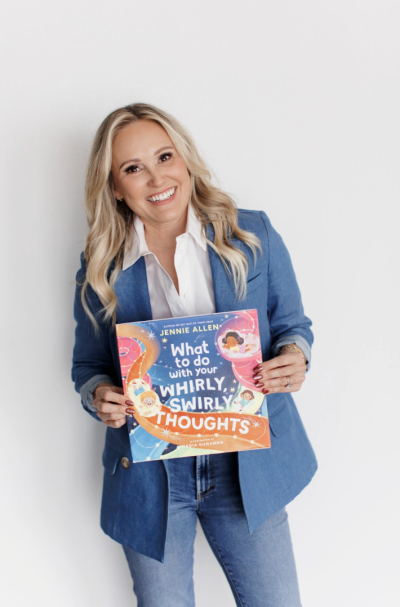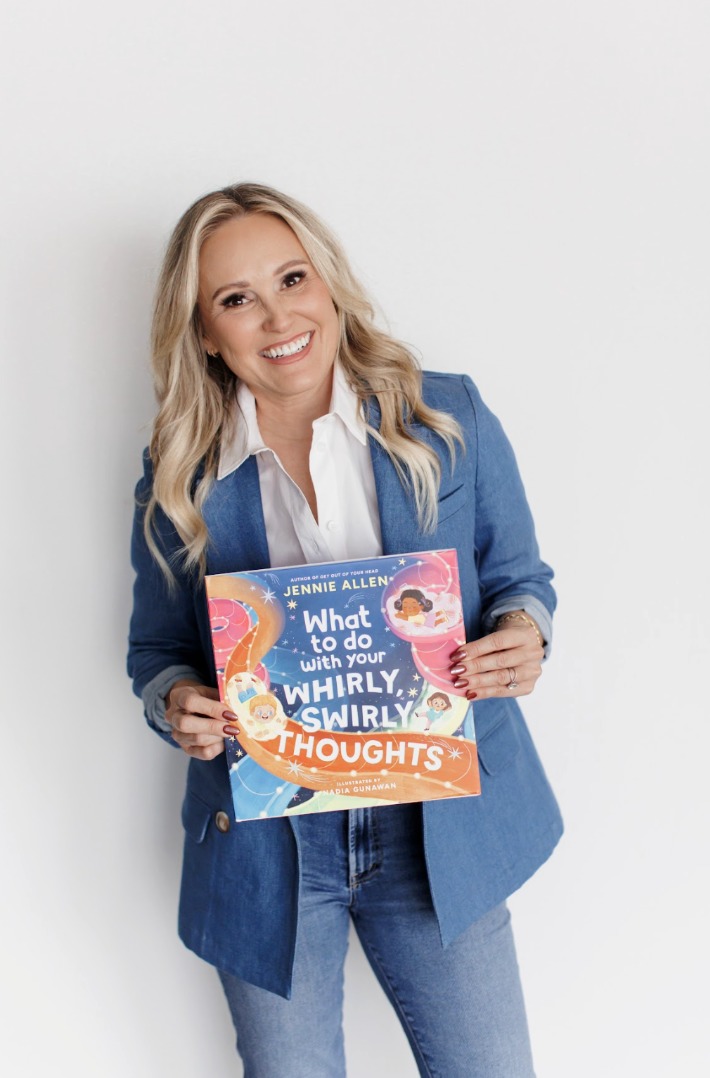
For years, Jennie Allen has been helping adults confront the mental spirals that keep them stuck. As the author of Get Out of Your Head and Untangle Your Emotions, Allen has carved out a distinctive space at the intersection of faith and mental health, drawing on both theology and psychology to guide readers toward freedom.
But now, the Dallas-based Bible teacher and mother of four is turning her attention to a younger audience: children.
Allen’s new picture book, What to Do with Your Whirly, Swirly Thoughts,designed to help children understand and manage their thoughts, distills the core message of her adult work into an accessible, biblically sound and emotionally intelligent tool for families.
“As a mom, I’ve seen my kids wrestle with fear and anxiety at different stages,” the New York Times bestselling author and the founder and visionary of IF:Gathering & Gather25, told The Christian Post.
“I realized that we, as parents, have an opportunity to teach our kids early on that they are the boss of their thoughts. This book is really an extension of Get Out of Your Head, but it’s for a younger audience. I believe if we can equip kids with tools to stop the spiral in their minds, they won’t have to fight the same battles we did when they grow up.”
Allen’s book arrives at a time when anxiety levels in children have reached all-time highs: studies from the CDC and American Psychological Association point to rising mental health challenges among youth, especially in the wake of the pandemic and the ongoing pressure of digital life.
“I think kids today are bombarded with so much input,” Allen said, reflecting on these trends. “Our prefrontal cortex is still developing well into our 20s and they’re trying to process all of that input without the full tools to deal with it. Parents can respond with grace by giving their kids space to express their feelings, but also with wisdom by helping them filter the lies and focus on what is true. We need to help them focus on God’s promises and let that be their anchor.”
With gentle language and colorful illustrations,What to Do with Your Whirly, Swirly Thoughts offers children practical strategies to name their thoughts, test them and replace them with what’s true. Applicable Scripture verses are woven throughout the pages to reaffirm that God has given them power over their thoughts.
When it comes to talking about feelings with children, Allen said it starts with validating their emotions, not dismissing them.
“I would tell every kiddo with big feelings, ‘Of course you feel that way,’” she said. “It’s normal to have big feelings, but those feelings don’t have to have control over you. The key is recognizing that just because you feel something doesn’t mean it’s true. We teach them to stop and ask, ‘Is this thought true? Is this thought helpful?’ And then we provide the tools to replace negative thoughts with truth.”
It’s a message that reflects how Allen and her husband, Zac, have approached parenting their four children, instilling helpful practices in them from a young age.
“I’ve watched my own kids struggle with anxiety, especially in the face of things they can’t control,” she said. “What’s been most helpful is teaching them to interrupt those thoughts. When my kids start spiraling, I encourage them to talk it out, identify what’s true about themselves and God, and replace the lie with the truth. Giving them the language to recognize their thoughts has been so powerful.”
For Allen, the book isn’t just about giving children the tools for emotional regulation; more importantly, it’s about spiritual formation. Her approach is intentionally grounded in biblical truth, and she sees no contradiction between helping children develop emotional intelligence and pointing them toward Christ.
“Faith is the foundation of everything in this book,” she said. “It’s about teaching kids that their identity is anchored in who God says they are, not in what they feel or what others say. I wanted to blend both faith and mental health by showing kids that God has given them the tools to fight against fear. We use Scripture to combat anxiety, and we talk about the brain science of how thoughts affect our emotions. It’s a holistic approach that gives them both spiritual and practical tools to navigate their feelings.”
That same integration of truth and compassion has shaped Allen’s broader ministry, including IF:Gathering — the annual women’s discipleship event she founded — and Gather25, a newer initiative designed to activate a generation of believers.
In late February, an unprecedented 7 million people from 225 countries and territories came together for Gather25, featuring live gatherings in seven locations and over 21,000 groups meeting in churches and homes to pray together.
Through both the IF:Gathering and Gather25, Allen said she’s watched young people lean into a deeper, more authentic version of Christianity.
“I’m seeing a generation that is hungry for authenticity,” she said. “They’re not interested in a faith that’s all talk — they want something real that makes a difference in their lives. Through Gather25, I’ve seen young people step up to lead and create community in ways that make me so hopeful. This generation has the opportunity to redefine what it looks like to live out their faith in a world that’s full of noise. They are uniquely positioned to be change-makers because they understand the power of connection and real, honest community.”
But for Allen, it always comes back to the home, to the parent who sees their child quietly struggling and doesn’t know what to do next.
“I would say: You’re not alone, and your child is not alone,” she said. “This is a battle many kids are facing today, but it’s one they can overcome. Start with listening and offering them a safe space to talk about their feelings. Then, teach them that their thoughts don’t have to stay stuck in the swirly thoughts. Give them the tools to reset, breathe, and focus on what’s true. It’s never too early to teach them how to renew their minds in Christ.”
She hopes What to Do with Your Whirly, Swirly Thoughts will become a spark and a conversation starter that can help shape how families talk about emotions, faith and identity. Her goal, she said, is to help the next generation live what they believe.
“I hope this book sparks real conversations in families — conversations about the power of our thoughts, the truth of God’s Word, and how we can support each other in our whirly swirly moments,” she said. “Beyond the pages, my bigger vision is that this book will help families build healthier thought patterns and stronger relationships with each other and with God. I want this to be the start of a journey that will help kids and parents face their fears together, with God’s truth as their foundation.”
Leah M. Klett is a reporter for The Christian Post. She can be reached at: leah.klett@christianpost.com








